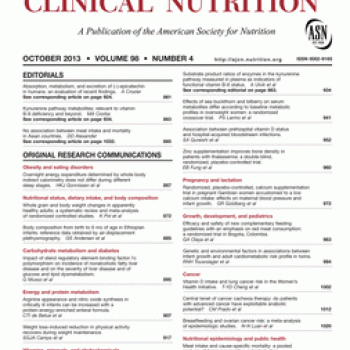Publication Information

Background: Early life growth failure and resulting cognitive deficits are often assumed to be very difficult to reverse after infancy.
Objective: We used data from Young Lives, which is an observational cohort of 8062 children in Ethiopia, India, Peru, and Vietnam, to determine whether changes in growth after infancy are associated with schooling and cognitive achievement at age 8 y.
Design: We represented the growth by height-for-age z score at 1 y [HAZ(1)] and height-for-age z score at 8 y that was not predicted by the HAZ(1). We also characterized growth as recovered (stunted at age 1 y and not at age 8 y), faltered (not stunted at age 1 y and stunted at age 8 y), persistently stunted (stunted at ages 1 and 8 y), or never stunted (not stunted at ages 1 and 8 y). Outcome measures were assessed at age 8 y.
Results: The HAZ(1) was inversely associated with overage for grade and positively associated with mathematics achievement, reading comprehension, and receptive vocabulary. Unpredicted growth from 1 to 8 y of age was also inversely associated with overage for grade (OR range across countries: 0.80?0.84) and positively associated with mathematics achievement (effect-size range: 0.05?0.10), reading comprehension (0.02?0.10), and receptive vocabulary (0.04?0.08). Children who recovered in linear growth had better outcomes than did children who were persistently stunted but were not generally different from children who experienced growth faltering.
Conclusions: Improvements in child growth after early faltering might have significant benefits on schooling and cognitive achievement. Hence, although early interventions remain critical, interventions to improve the nutrition of preprimary and early primary school-age children also merit consideration.
Keywords: childhood growth, growth failure, early nutrition, schooling outcomes
The final published version of the article is available on the journal website.

Background: Early life growth failure and resulting cognitive deficits are often assumed to be very difficult to reverse after infancy.
Objective: We used data from Young Lives, which is an observational cohort of 8062 children in Ethiopia, India, Peru, and Vietnam, to determine whether changes in growth after infancy are associated with schooling and cognitive achievement at age 8 y.
Design: We represented the growth by height-for-age z score at 1 y [HAZ(1)] and height-for-age z score at 8 y that was not predicted by the HAZ(1). We also characterized growth as recovered (stunted at age 1 y and not at age 8 y), faltered (not stunted at age 1 y and stunted at age 8 y), persistently stunted (stunted at ages 1 and 8 y), or never stunted (not stunted at ages 1 and 8 y). Outcome measures were assessed at age 8 y.
Results: The HAZ(1) was inversely associated with overage for grade and positively associated with mathematics achievement, reading comprehension, and receptive vocabulary. Unpredicted growth from 1 to 8 y of age was also inversely associated with overage for grade (OR range across countries: 0.80?0.84) and positively associated with mathematics achievement (effect-size range: 0.05?0.10), reading comprehension (0.02?0.10), and receptive vocabulary (0.04?0.08). Children who recovered in linear growth had better outcomes than did children who were persistently stunted but were not generally different from children who experienced growth faltering.
Conclusions: Improvements in child growth after early faltering might have significant benefits on schooling and cognitive achievement. Hence, although early interventions remain critical, interventions to improve the nutrition of preprimary and early primary school-age children also merit consideration.
Keywords: childhood growth, growth failure, early nutrition, schooling outcomes
The final published version of the article is available on the journal website.

